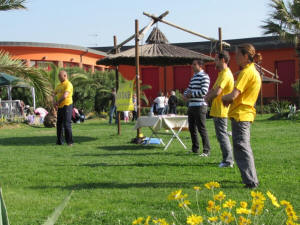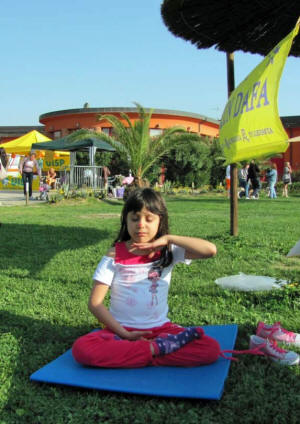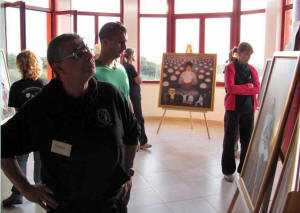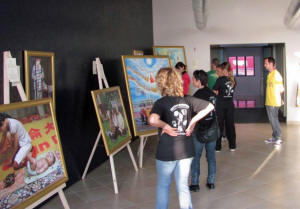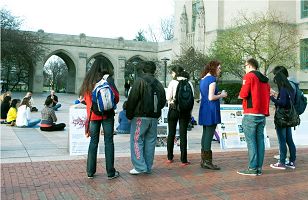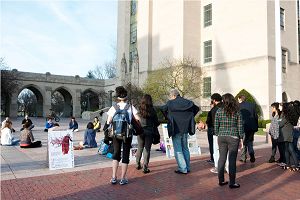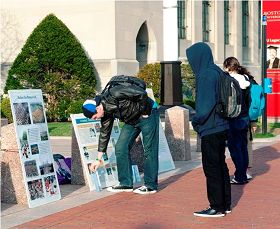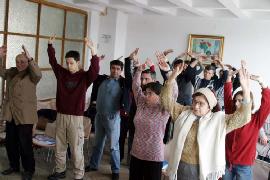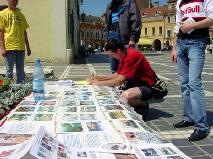Falun Gong practitioners in China were marked before they gathered on April 25
On April 25, 1999, the most “serious political incident” since 1989 occurred in China. Over 10,000 practitioners of Falun Gong, a spiritual practice, had quietly gathered on the streets of Beijing and silently stood and sat from morning to night, seeking to be allowed to practice their faith free from harassment.
The incident is often seen as the catalyst to what happened next: a nationwide Cultural Revolution-style persecution featuring incessant propaganda, cruel violence, labor camps, and thought reeducation campaigns that continues to this day. But a look at the three years that preceded that incident shows that rather than being the catalyst to the persecution, it was practitioners’ last-ditch effort to head off what hardliners inside the Communist Party had been hatching since 1996.
Falun Gong is a Chinese spiritual practice with five meditative exercises; it teaches behaving according to the three principles of truthfulness, compassion, and forbearance. From its introduction in China in 1992 until its suppression in 1999 it had gained between 70 million and 100 million followers.
The campaign against Falun Gong began in 1996. For the next three years, until the persecution as a mass movement became official, there were attempts to begin stamping out Falun Gong’s influence in China, by spreading negative propaganda, infiltrating practice groups, issuing politically charged labels, and laying the groundwork for further suppression.
During that period, Falun Gong practitioners inside and outside the Party and state were attempting to head it off, until in 1999 when Falun Gong’s delaying tactics ran out, and the Communist Party set out to “eradicate” the practice of Falun Gong.
Propaganda
In July 1996, the authorities began to move against Falun Gong in an article harshly attacking the practice’s book of teachings, Zhuan Falun, which was a nationwide bestseller at the time.
The article appeared in one of the CCP’s standard-bearer publications, the Guangming Daily, and was written by Pan Guoyan, who was then deputy head of the General Administration of Press and Publication, the agency charged with propaganda and censorship in book publishing.
Ye Hao was the head of the Falun Gong Research Society—the institutional face of Falun Gong in China—and also a director in the Public Security Bureau. Now in his 70s and at that time already an “old comrade” who first approached qigong through the lens of dialectical materialism, Ye knew the internal conversation going on in the Party about qigong and Falun Gong. He said it was Xu Guangchun, then vice minister of the Central Propaganda Department, who organized newspapers to attack Falun Gong.
A rash of propaganda in over 20 major newspapers followed the Guangming Daily piece, and the Central Propaganda Department then dropped the guillotine on the publishing license for Zhuan Falun.
The book banning was the first of many measures the authorities would take over the next few years to attempt to curb the growth of Falun Gong and undo its influence on Chinese society. The book was still printed, however, even in official presses, because people in the system thought Falun Gong was good.
Another attempt, according to Ye, was made by the United Front Work Department when it called a large meeting in 1996 specifically to tell the “eight minor parties,” Communist Party political fronts, that Falun Gong was a “heretical religion” and would be outlawed. But that also did not lead to a nationwide suppression.
Slanderous press kept coming, however.
Mr. Qing Yang, a Falun Gong contact person in China at the time, who now lives in the United States, said that when launching political movements, “The first thing the Party does is propaganda. The second thing is to make up an investigation and fabricate evidence.”
Investigations
Ms. Wang, 65, a practitioner in China at the time, felt it was strange when a young man turned up to learn the exercises one day, and then began asking lots of questions. “What’s your name? Where do you live? What’s your work unit?” he would ask.
“Normally people who practice Falun Gong would just read the book and practice, they wouldn’t ask detailed questions like that,” she said.
Two national investigations had been ordered by the Ministry of Public Security, in January and July 1997, to collect evidence that Falun Gong was engaged in “illegal religious activities.” The outcome reported from infiltrators was, “no problems yet found.”
Police easily infiltrated practice groups owing to Falun Gong’s principle of being open to everyone.
A year later, on July 21, 1998, the ministry launched another investigation, this time directly declaring Falun Gong a “heretical religion” (xiejiao) in an internal memo. Police stations were ordered to collect intelligence on practitioners for proof of wrongdoing.
This label would later be revived, translated into English as “evil cult,” and made the mainstay of anti-Falun Gong propaganda for four months after the persecution officially began in July of 1999.
Western scholars in their research, and Ye Hao in the interview, indicated that the successive investigations by the Public Security Bureau, followed by the final order to simply label Falun Gong a heretical religion, indicated an internal struggle in the department between ideological opponents and supporters.
Wang Bin, a Falun Gong volunteer coordinator in Haidian District, Beijing, at the time, said that things heated up after the “heretical religion” label. “They beat people, issued fines, [and] searched houses.” He said that more extreme incidents took place in more remote areas.
Wang Bin highlighted the complexity of the events. People within the Party apparatus were seeking to make moves against Falun Gong, while protectors and practitioners tried to head them off. “There were a lot of people practicing Falun Gong at high levels in the government at that time,” he said in a telephone interview, before rattling off a list of names. “A lot of people thought Falun Gong shouldn’t be monitored.”
Counter-Investigations
After the two PSB investigations, the Sports Commission also launched its own investigation. This was an institution, which though part of the government, had a history of relatively amicable relations with Falun Gong.
The team—led by a professor who practiced Falun Gong—studied the effects of the practice on more than 12,000 people in Guangdong Province. It reported that 97.9 percent of respondents said their health had improved, and that huge savings in health care could be gained.
Another investigation was led by Qiao Shi, former chairman of the National People’s Congress and a high-profile cadre with a long career in the public security apparatus. He repeatedly came to the defense of Falun Gong, and in an investigation concluded in the latter half of 1998 reported to the Communist Party’s Central Committee’s Political and Legislative Affairs Bureau, “Falun Gong brings countless benefits to the nation and its people, and not a trace of harm.”
Xu Yin was a professor of civil engineering at Tsinghua University at the time and a volunteer organizer in that university’s Falun Gong club. He organized high-profile letter-writing campaigns with hundreds of prominent intellectuals who practiced.
The spread and composition of practitioners was troubling to communist authorities. As well as attracting peasants and the elderly, Falun Gong had gained practitioners in the army, the police, the intelligence services, and throughout the Communist Party.
Over a fifth of the practitioners were college graduates, a significantly higher proportion than the average population in China.
Resistance
Ai Weiwei, the recently detained artist-cum-dissident (who is not a Falun Gong practitioner) has said, “If you don’t act, the dangers become stronger.”
Falun Gong practitioners in China said in interviews that their choice to stand firm against intensifying pressure was the only thing that stopped the persecution from descending earlier.
From June 1996 to April 1999, practitioners were proactive in responding to negative media and staged peaceful demonstrations against articles they perceived as slanderous.
The demonstrations were considered brazen in China, where independent groups are not expected to assert their civic rights or publicly seek to gain positive representation.
Practitioners approached media outlets with their personal stories of how Falun Gong had helped or transformed them, they said in interviews, and the journalists and editors were then often understanding and receptive.
Practitioners said in interviews that they were also bargaining for the future of their faith in China.
Ye Hao explained the thinking behind the appeals: “When they are treated unfairly, they go and speak out: ‘Falun Dafa is good. I personally benefited. Originally my sickness was bad and Falun Dafa gave me a second life.’ They don’t say anything else, they just speak from their own experience.”
They hoped that simple testimonials of this kind would convince the Communist Party not to “make a wrong decision.”
Ye Hao says the Party was determined. “If they want to persecute you, they will absolutely do so. All we could do was try to alleviate it.”
Xu Yin, the Tsinghua professor, reflected on the beginnings of the propaganda campaign and what followed. “They had already fixed on us, they had targeted us,” he said. “We tried to be careful [in confronting the Party]. If we had done nothing, it would have been worse.”
On April 25, 1999, the most “serious political incident” since 1989 occurred in China. Over 10,000 practitioners of Falun Gong, a spiritual practice, had quietly gathered on the streets of Beijing and silently stood and sat from morning to night, seeking to be allowed to practice their faith free from harassment.
 |
| Falun Gong Practitioners in Huancui District of Weihai City Perform Exercises at a Plaza in front of Weihai City Hall in the mid 1990's. (Courtesy of Minghui.net) |
The incident is often seen as the catalyst to what happened next: a nationwide Cultural Revolution-style persecution featuring incessant propaganda, cruel violence, labor camps, and thought reeducation campaigns that continues to this day. But a look at the three years that preceded that incident shows that rather than being the catalyst to the persecution, it was practitioners’ last-ditch effort to head off what hardliners inside the Communist Party had been hatching since 1996.
Falun Gong is a Chinese spiritual practice with five meditative exercises; it teaches behaving according to the three principles of truthfulness, compassion, and forbearance. From its introduction in China in 1992 until its suppression in 1999 it had gained between 70 million and 100 million followers.
The campaign against Falun Gong began in 1996. For the next three years, until the persecution as a mass movement became official, there were attempts to begin stamping out Falun Gong’s influence in China, by spreading negative propaganda, infiltrating practice groups, issuing politically charged labels, and laying the groundwork for further suppression.
During that period, Falun Gong practitioners inside and outside the Party and state were attempting to head it off, until in 1999 when Falun Gong’s delaying tactics ran out, and the Communist Party set out to “eradicate” the practice of Falun Gong.
Propaganda
In July 1996, the authorities began to move against Falun Gong in an article harshly attacking the practice’s book of teachings, Zhuan Falun, which was a nationwide bestseller at the time.
The article appeared in one of the CCP’s standard-bearer publications, the Guangming Daily, and was written by Pan Guoyan, who was then deputy head of the General Administration of Press and Publication, the agency charged with propaganda and censorship in book publishing.
Ye Hao was the head of the Falun Gong Research Society—the institutional face of Falun Gong in China—and also a director in the Public Security Bureau. Now in his 70s and at that time already an “old comrade” who first approached qigong through the lens of dialectical materialism, Ye knew the internal conversation going on in the Party about qigong and Falun Gong. He said it was Xu Guangchun, then vice minister of the Central Propaganda Department, who organized newspapers to attack Falun Gong.
 |
| STILL: Ye Hao, a coordinator in the Falun Gong community in China before the persecution and official in the public security apparatus. He meditates in New York in 2009. (Courtesy of Minghui.net) |
A rash of propaganda in over 20 major newspapers followed the Guangming Daily piece, and the Central Propaganda Department then dropped the guillotine on the publishing license for Zhuan Falun.
The book banning was the first of many measures the authorities would take over the next few years to attempt to curb the growth of Falun Gong and undo its influence on Chinese society. The book was still printed, however, even in official presses, because people in the system thought Falun Gong was good.
Another attempt, according to Ye, was made by the United Front Work Department when it called a large meeting in 1996 specifically to tell the “eight minor parties,” Communist Party political fronts, that Falun Gong was a “heretical religion” and would be outlawed. But that also did not lead to a nationwide suppression.
Slanderous press kept coming, however.
Mr. Qing Yang, a Falun Gong contact person in China at the time, who now lives in the United States, said that when launching political movements, “The first thing the Party does is propaganda. The second thing is to make up an investigation and fabricate evidence.”
Investigations
Ms. Wang, 65, a practitioner in China at the time, felt it was strange when a young man turned up to learn the exercises one day, and then began asking lots of questions. “What’s your name? Where do you live? What’s your work unit?” he would ask.
“Normally people who practice Falun Gong would just read the book and practice, they wouldn’t ask detailed questions like that,” she said.
Two national investigations had been ordered by the Ministry of Public Security, in January and July 1997, to collect evidence that Falun Gong was engaged in “illegal religious activities.” The outcome reported from infiltrators was, “no problems yet found.”
 |
| Over 10,000 Falun Gong practitioner gather for a group practice in Shengyang City, May 1998. (Courtesy of Minghui.net) |
Police easily infiltrated practice groups owing to Falun Gong’s principle of being open to everyone.
A year later, on July 21, 1998, the ministry launched another investigation, this time directly declaring Falun Gong a “heretical religion” (xiejiao) in an internal memo. Police stations were ordered to collect intelligence on practitioners for proof of wrongdoing.
This label would later be revived, translated into English as “evil cult,” and made the mainstay of anti-Falun Gong propaganda for four months after the persecution officially began in July of 1999.
Western scholars in their research, and Ye Hao in the interview, indicated that the successive investigations by the Public Security Bureau, followed by the final order to simply label Falun Gong a heretical religion, indicated an internal struggle in the department between ideological opponents and supporters.
Wang Bin, a Falun Gong volunteer coordinator in Haidian District, Beijing, at the time, said that things heated up after the “heretical religion” label. “They beat people, issued fines, [and] searched houses.” He said that more extreme incidents took place in more remote areas.
Wang Bin highlighted the complexity of the events. People within the Party apparatus were seeking to make moves against Falun Gong, while protectors and practitioners tried to head them off. “There were a lot of people practicing Falun Gong at high levels in the government at that time,” he said in a telephone interview, before rattling off a list of names. “A lot of people thought Falun Gong shouldn’t be monitored.”
Counter-Investigations
After the two PSB investigations, the Sports Commission also launched its own investigation. This was an institution, which though part of the government, had a history of relatively amicable relations with Falun Gong.
The team—led by a professor who practiced Falun Gong—studied the effects of the practice on more than 12,000 people in Guangdong Province. It reported that 97.9 percent of respondents said their health had improved, and that huge savings in health care could be gained.
 |
| ACROSS CHINA: A practice site in the Northeast of China in the mid 1990's. (Courtesy of Minghui.net) (Courtesy of Minghui.net) |
Another investigation was led by Qiao Shi, former chairman of the National People’s Congress and a high-profile cadre with a long career in the public security apparatus. He repeatedly came to the defense of Falun Gong, and in an investigation concluded in the latter half of 1998 reported to the Communist Party’s Central Committee’s Political and Legislative Affairs Bureau, “Falun Gong brings countless benefits to the nation and its people, and not a trace of harm.”
Xu Yin was a professor of civil engineering at Tsinghua University at the time and a volunteer organizer in that university’s Falun Gong club. He organized high-profile letter-writing campaigns with hundreds of prominent intellectuals who practiced.
The spread and composition of practitioners was troubling to communist authorities. As well as attracting peasants and the elderly, Falun Gong had gained practitioners in the army, the police, the intelligence services, and throughout the Communist Party.
Over a fifth of the practitioners were college graduates, a significantly higher proportion than the average population in China.
Resistance
Ai Weiwei, the recently detained artist-cum-dissident (who is not a Falun Gong practitioner) has said, “If you don’t act, the dangers become stronger.”
Falun Gong practitioners in China said in interviews that their choice to stand firm against intensifying pressure was the only thing that stopped the persecution from descending earlier.
From June 1996 to April 1999, practitioners were proactive in responding to negative media and staged peaceful demonstrations against articles they perceived as slanderous.
 |
| A group practice site at Beijing Jietai Temple in 1996. (Courtesy of Minghui.net) |
The demonstrations were considered brazen in China, where independent groups are not expected to assert their civic rights or publicly seek to gain positive representation.
Practitioners approached media outlets with their personal stories of how Falun Gong had helped or transformed them, they said in interviews, and the journalists and editors were then often understanding and receptive.
Practitioners said in interviews that they were also bargaining for the future of their faith in China.
Ye Hao explained the thinking behind the appeals: “When they are treated unfairly, they go and speak out: ‘Falun Dafa is good. I personally benefited. Originally my sickness was bad and Falun Dafa gave me a second life.’ They don’t say anything else, they just speak from their own experience.”
They hoped that simple testimonials of this kind would convince the Communist Party not to “make a wrong decision.”
Ye Hao says the Party was determined. “If they want to persecute you, they will absolutely do so. All we could do was try to alleviate it.”
Xu Yin, the Tsinghua professor, reflected on the beginnings of the propaganda campaign and what followed. “They had already fixed on us, they had targeted us,” he said. “We tried to be careful [in confronting the Party]. If we had done nothing, it would have been worse.”












